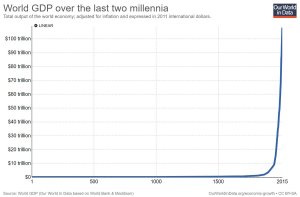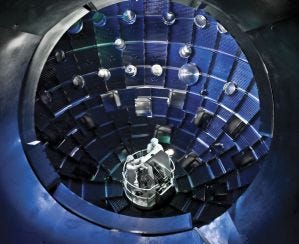The Future’s So Bright?
A broadside against the climate-fueled nihilism of Gen Z.
The kids aren’t alright.
Young Americans, especially those labeled as being part of ‘Gen Z’ (born between 1995 and 2010, give or take a year), are in the throes of a mental health crisis. Self-reported depression and anxiety have spiked, suicidality has increased significantly, and a larger portion of these young people, as compared to older generations, have had interactions with mental health practitioners. Both statistics and anecdotal evidence from clinicians prove this point. Causes have varied widely, from the easily understood to the more socially complex. On the former front, the government reactions to the Covid-19 pandemic have wreaked havoc on youth mental health. Lockdowns, remote schooling, social alienation, and masking have all interrupted the regular life cycle of the American adolescent and have caused serious, documented harm to vast portions of Gen Z (and many others). On the more complex side of the ledger, ubiquitous social media and smartphone technology have arguably made major negative impacts. The constant quest for social approval, ease of presenting a false portrait of perfection, and algorithmic manipulation of emotions all play a part in exerting a malign influence on American youth.
Another, more contentious, potential cause for Gen Z’s mental breakdown is a relatively new phenomenon: climate anxiety. A major survey conducted by Nature shows that nearly 60% of Gen Z across the world is either ‘extremely worried’ or ‘very worried’ about climate change; a full 45% of those surveyed said that this anxiety impacts their daily lives in a negative manner. This is highly concerning – and not only because the level of anxiety is not at all commensurate with the level of threat, regardless of what radical activists claim. It is primarily concerning because it is breeding a nihilistic attitude among young people, exacerbating their existing mental health issues. A puff piece supporting this nihilism was published recently in Fortune (archive link here), and reader, it made me mad.
The article – titled ‘Gen Z’s antiwork mentality has a lot to do with the ‘world crumbling’ around them’ – profiled a series of young adults who are distraught about the state of the climate and the future of humanity, and have consequently checked out of regular adult life. The piece praises this antiwork movement as a reasonable response to a life which is supposedly inevitably defined by financial disaster, the omnipresent specter of mass murder, and, most pressingly, the ongoing ecological catastrophe. These deranging delusions around climate change and the downfall of humanity are endorsed and promoted by media and purported ‘experts’. Their positioning on these issues is radical and has helped convince a generation of Americans (including some influential Congresspeople) that without extreme political action, the world itself will end.
Expectedly, this constant narrative of permanent crisis has created an epidemic of nihilism among American youth. Why care about today when tomorrow is so bleak? These passages from the Fortune piece are particularly representative of this general idea:
… it’s climate change that’s the final nail in the coffin for some young employees who are already questioning the value of their jobs. Worse than expected global warming and rising sea levels have painted a dismal picture of the future, leaving some young workers to view corporate work with more apathy and less ambition. …
When much of the Earth is facing one climate crisis or another (fire, flood, famine), it pushes the nine-to-five further into perspective. “It’s hard to stress too much over work as we can see the world crumbling in front of us,” Kpenkaan says. “Emails or even TikTok numbers seem pretty small compared to all the climate news we receive on a daily basis.”
The nihilism inherent in the last sentence is especially direct; the idea that there is no point in the mundanity of daily existence because of some impending doom is a staple of nihilistic thinking. What does life matter if it isn’t defined by happiness or success? As thousands of years of human philosophy and theology teach, still quite a lot! (The problem may be aggravated when you are making meaning mainly via emails or “even TikTok numbers.” Just a thought.)
This civilizational nihilism has led Gen Z’ers to avoid saving, planning for the future, or even pushing to achieve personal goals. Ironically enough, those actions will only exacerbate future mental health issues and create real problems that are impactful on a personal level, unlike small changes in global surface temperatures. One person quoted in the Fortune story says that “It feels weird to be going into my job every day knowing that the looming future—or lack of a future—is just completely out of my control.” Another states that “Having that promise of longevity, it’s just not something that our generation got. At every single turn, we saw how our lives could be either incomplete or cut short.”
This destructive, nihilistic mindset is not only part and parcel of the broader anti-civilization ideology behind the radical climate cult, but it is also incredibly historically uninformed. The Gen Z’ers – particularly the American ones referenced in the Fortune piece – who subscribe to this sentiment woefully misunderstand their position as compared to earlier generations. People who are alive today, anywhere in the world, are some of the most privileged and lucky people who have ever had the fortune of existing on this planet. Global prosperity (measured by GDP) has exploded exponentially over the past 300 years, moving from a global norm of subsistence living to a world in which items previously seen as luxuries are nearly universally accessible. That trend of productive growth has continued through the 20th century, with standards of living rising consistently over the period and not abating in the 21st century thus far. Human lifespans have risen commensurately, as the average human today lives almost twice as long as his ancestors in the late 18th century.
The amazing living situation of Americans today is taken for granted, as far too many people – especially in younger generations – have no idea as to how good they have it. The plaintive cries about an uncertain future and the potential for early death are laughable when compared to those same factors even 50 years ago. In 1970, serial killings were not uncommon, stagflation was destroying the economy, America was involved in an unpopular war in which people were drafted unwillingly, and we lived in the constant shadow of nuclear Armageddon. Sounds a lot more uncertain than potential temperature increases of 2°C over the course of a hundred years!
How about, for fun, we go even further back? Maybe add another 100 years or so? In 1870, America was coming out of a Civil War which crippled our nation and killed hundreds of thousands of Americans (mostly around the age that Gen Z is now), the Ku Klux Klan (actual white supremacists) was regularly terrorizing and lynching African-Americans across the South, children often died of totally curable or preventable diseases, and the factories of the big cities were essentially deathtraps for the adults and children who worked in them. The future didn’t exactly look bright for those people, but they soldiered on and built the world which would continue to progress under their offspring.
What would’ve happened if the people of 1970, 1870, or any other challenging period in human history had the same nihilistic outlook as Gen Z’ers do today? First of all, most of us wouldn’t exist. Secondly, none of the technologies and ideas which have produced the incredible blessings of modern life would be around. The continued belief in the future of humanity, despite horrific headwinds and serious civilizational problems, is necessary for human progress. Without that hopeful, forward movement, we will miss out on the innovations that will build the amazing world which our progeny will inhabit.
Interestingly enough, a glimpse of that wonderful potential future came just a few days ago. American scientists announced that they had a breakthrough in the long quest for nuclear fusion, creating a fusion reaction which generated net energy. Fusion, the combination of two hydrogen atoms into a helium atom through the introduction of heat energy, is the process which powers our Sun. If controlled and harnessed, it has the potential for almost-unlimited energy generation with few or no byproducts, using readily-available natural elements. Scientists have been attempting to create a stable fusion process for decades, but the recent breakthrough is truly a step beyond previous successes. Earlier experiments were able to generate a fusion reaction, but it took more energy to create and control this reaction than the reaction itself produced. Now, we have achieved net energy gain – more energy was produced by the fusion process than was consumed by it. This is essentially proof of concept for the next truly world-changing innovation.
Nuclear fusion, if successful and widespread, would solve the ‘climate crisis’ Gen Z is so worried about. It would power our modern society easily, allowing us to escape some of the constraints which have held science and technology back. Unlimited clean energy would allow us to permanently escape the Earth, colonizing the planets of our solar system and potentially reaching new systems entirely. The sci-fi worlds seen on the silver screen would be our reality. Horizons previously seen as unreachable would be within reach. Developments which we cannot even imagine would be possible.
But all of this relies on the continued human mindset of progress and investment in a future we may never ourselves live to realize. The nihilism which seems to have consumed so many in Gen Z is anathema to this forward-looking sentiment. The juxtaposition of the intense climate anxiety and antiwork ideology explored in the Fortune article with the positively groundbreaking future potential of nuclear fusion is jarring. We live in glorious times, and have the ability to guarantee even better lives for our children. None of that is possible, however, without work and the belief that such work serves a purpose larger than ourselves. Losing that essential spark of humanity to a dour depression stoked by media, academia, and politicians would be a true catastrophe for the species.
The future is bright, but we must believe that ourselves before we can make it reality.





